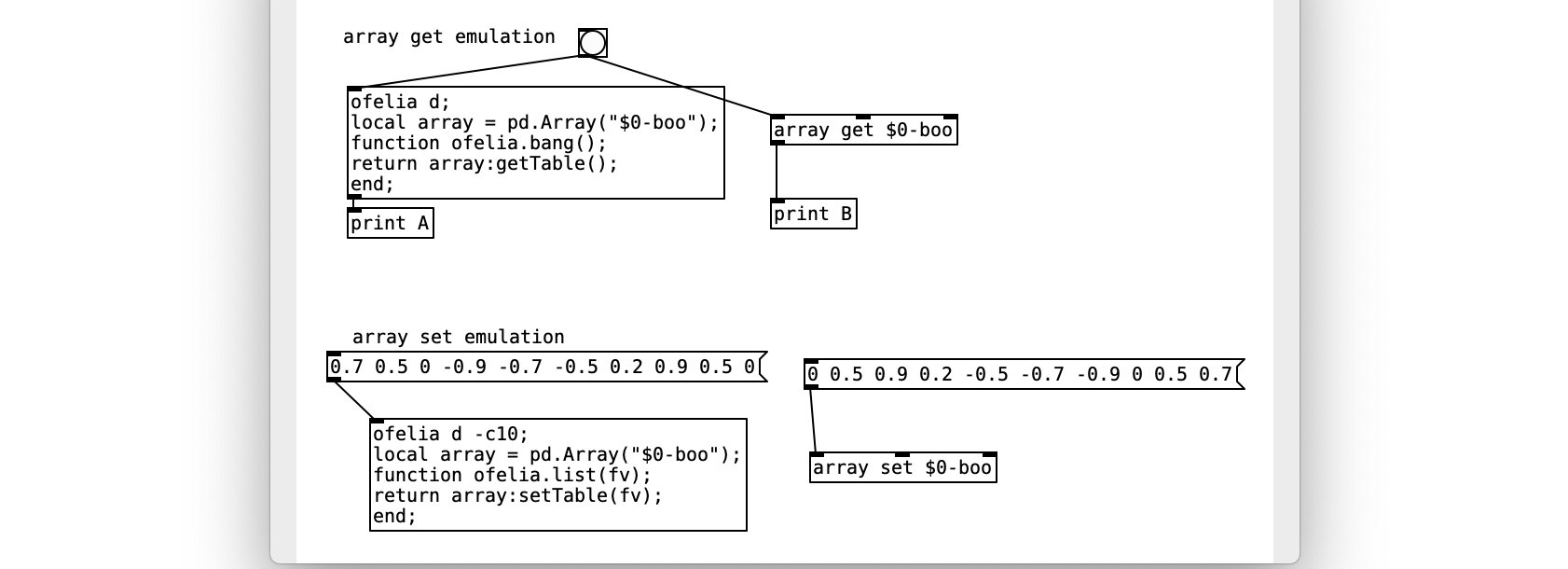For a first understanding of ofelia 2 and lua i studied ofelia-object-help.pd and tried to "simulate" a pd array with a lua table.
Somehow its not possible to use {} inside pure data objects or messages, otherwise i would put the lua script (while its short) directly into the [ofelia define] object.
ofelia_array.pd
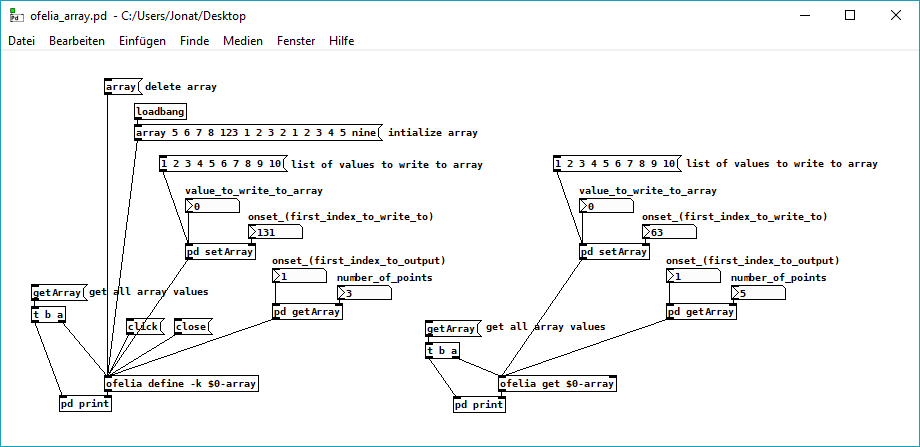
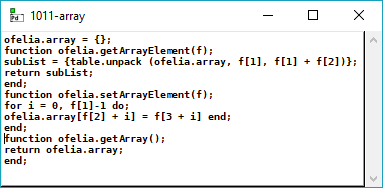
@cuinjune i have a few questions regarding ofelia 2 if it doesnt matter:
Is there a way to use the [ofelia] variables outside of the [ofelia] objects (like with the @ variables and [ofSnd] / [.ofRcv] / [ofValue] objects in the old version)?
Is [ofExpr] and [ofExpr~] replaced by [ofelia define] (see [inlets_and_outlets] example in the help file)?
Do you have any plans to port the pdgui abstractions in the future? I really like them, and also would like to port the multitoggle/slider/radio abstractions as a first project to the new version. And the pdgui abstractions were a very good starting point for that.
Creating of. abstractions doesnt look that difficult, but i still have to understand it in detail.
And thanks for the great library, still need to learn a lot (lua and open frameworks)...
-
ofelia lua table and a few questions
-
Hi Jona,
Yes, unfortunately, It is not allowed to use {} in Pd objects and message boxes for some reasons.
But using them in the text editor is possible.Regarding the variables in ofelia, the [pd variables] subpatch from "ofelia-object-help.pd" shows how variables can be shared between [ofelia] objects.
But If what you want is to assign a variable to Pd's [value], you can use pd.Value() class.
I attached a patch that shows how to do this. I also included some other examples that use classes belong to "pd" module.
pdexample.pdI think I should clean and add this patch to ofelia in the next update since the documentation is missing about these features. So thank you for asking this question.

And yes, I would now encourage users to use [ofelia define] for doing complex math calculations or [expr] for simpler ones. I removed those objects that used @ variables since now you don't have to name local variables using "$0" symbol in the new version. The main reason I created @ variable concept was to make [ofExpr] easier to write and read. (e.g. @var instead of "v$0_var") And now you only need to have one "$0" based name per "ofelia define" object in order to share variables between different objects.
Yes, I have a plan to port the pdgui abstractions in the close future since I think they are pretty useful.
Like you said, creating abstractions is not difficult at all. You can just copy and modify the existing abstraction which is similar to the one you're trying to create. For example, you will be able to easily create "jona.drawSquare" by copying and modifying "of.drawCircle" since they both have the same number of creation arguments, inlets and outlets.I hope this answered your question.
-
@cuinjune yes, that answered my questions, thanks for that. pd.Value() class sounds interesting, i will take a look into [pdexample].
-
@cuinjune the pd.Value class is very useful and what i was missing. great idea, thanks

The only example that isnt working (on my system?) is the array set emulation, but i couldnt figure out why...
Is there a list somewhere with the "commands/bindings" (dont know the right definition) of :setTable, :getAt, :setSize, :sendBang etc.?
I assume they communicate with pure data objects? -
@Jona I didn't make a documentation for the list of classes and methods into Ofelia yet. For now, you can find them from "ofelia/src/ofeliaBindings.h" file although it may be difficult to understand since it's C++ code.
They don't communicate with any pd object but they directly call internal pd methods that are written by Miller. -
@cuinjune i took a look into ofeliaBindings.h and i tried to make a list of the classes and methods that call internal pd methods.
i am not sure if it is correct / complete but at least it is an orientation for me.class Canvas int getIndex() void getArgs(int *argcp, t_atom **argvp, t_canvas **canvasp) void setArgs(int argc, t_atom *argv) void getPosition(int **posp) void setPosition(int xpos, int ypos) void remove() class Send void sendBang()sendFloat(t_floatarg f) void sendSymbol(t_symbol *s) void sendPointer(t_gpointer *p) void sendList(int argc, t_atom *argv) void sendAnything(int argc, t_atom *argv) class Inlet void setFloatInlet(t_floatarg f) void setFloatInlets(int n, t_floatarg *f) void setSignalInlet(t_floatarg f) class Outlet void outletBang(int index) void outletFloat(int index, t_floatarg f) void outletSymbol(int index, t_symbol *s) void outletPointer(int index, t_gpointer *p) void outletList(int index, int argc, t_atom *argv) void outletAnything(int index, int argc, t_atom *argv) class Value void set(t_floatarg f) class Array float getAt(int n) float getAt(int n) void getTable(t_word **vecp, int *sizep) void setTable(int n, t_floatarg *f) int getSize() void setSize(long n) class Clock void delay(double delayTime) void unset() class Sys double getRealTime() void lock() void unlock() int tryLock() void gui(t_symbol *s) class PD int getMaxString() int getFloatSize() t_float getMinFloat() t_float getMaxFloat() bool isBadFloat(t_floatarg f) bool isBigOrSmall(t_floatarg f) tuple<int, int, int> getVersion() -
@Jona Yes, If you added all methods under
public:and notprivate:then it should be the correct and complete list.But I noticed some methods are missing. (e.g. getName() in Canvas, get() in Value..)
You need to include all methods regardless of the return type.Thank you for making the list. I think it will be useful for other users and I need to document it inside Ofelia later.
-
second try. i commented out the lines where i am not sure if they are a methods (i am quite new to programming except for pure data and a little bit of python). there are only "public:" methods in the list.
class Canvas // Canvas(t_symbol *s) // Canvas(t_symbol *s, t_floatarg f) t_symbol *realizeDollar(t_symbol *s) t_symbol *getName() int getIndex() void getArgs(int *argcp, t_atom **argvp, t_canvas **canvasp) void setArgs(int argc, t_atom *argv) void getPosition(int **posp) void setPosition(int xpos, int ypos) t_symbol *getDir() void remove() class Send // Send(t_symbol *s) void sendBang()sendFloat(t_floatarg f) void sendSymbol(t_symbol *s) void sendPointer(t_gpointer *p) void sendList(int argc, t_atom *argv) void sendAnything(int argc, t_atom *argv) class Inlet // Inlet(t_symbol *s) void setFloatInlet(t_floatarg f) void setFloatInlets(int n, t_floatarg *f) void setSignalInlet(t_floatarg f) class Outlet // Outlet(t_symbol *s) void outletBang(int index) void outletFloat(int index, t_floatarg f) void outletSymbol(int index, t_symbol *s) void outletPointer(int index, t_gpointer *p) void outletList(int index, int argc, t_atom *argv) void outletAnything(int index, int argc, t_atom *argv) class Value // Value(t_symbol *s) virtual ~Value() t_float get() void set(t_floatarg f) class Array // Array(t_symbol *s) bool exists(t_garray **a) float getAt(int n) float getAt(int n) void getTable(t_word **vecp, int *sizep) void setTable(int n, t_floatarg *f) int getSize() void setSize(long n) class Clock // Clock(t_symbol *s) // Clock(t_symbol *s, t_symbol *s2) virtual ~Clock() void delay(double delayTime) void unset() class Sys double getRealTime() void lock() void unlock() int tryLock() void gui(t_symbol *s) class Signal int getBlockSize() t_float getSampleRate() int getInChannels() int getOutChannels() bool getDspState() class PD int getMaxString() int getFloatSize() t_float getMinFloat() t_float getMaxFloat() bool isBadFloat(t_floatarg f) bool isBigOrSmall(t_floatarg f) tuple<int, int, int> getVersion() // int maxString; // int floatSize; // t_float minFloat; // t_float maxFloat; // tuple<int, int, int> version; class Log void post(const char *s) void post(const char *s, int level) void startPost(const char *s) void postString(const char *s) void postFloat(t_floatarg f) void postAtom(int argc, t_atom *argv) void endPost() void error(const char *s) -
@cuinjune it could be nice to emulate the "array set" and "array get" (with the functionality they have in pure data) in addition or instead of the tabread or tabwrite emulation if that is possible. i don´t know if that makes sense? the "array set" emulation in pdexample.pd only changes the arraysize, but doesnt set the values at the moment.
-
-
@cuinjune hi. "array get emulation" works but outputs the whole array, while with the pure data "array get" you can also set "first index to output" and "number of points". same for the pure data "array set" while the number of points is defined by the length of the input list and the array isnt resized (the set values are inserted).
array set emulation doesnt work for me, it just resizes the array (win10 pd64bit).
but should define a new array and not just insert some values?
here i tried to emulate pure data "array set" with the "setAt" method:
array_set_emulation.pd
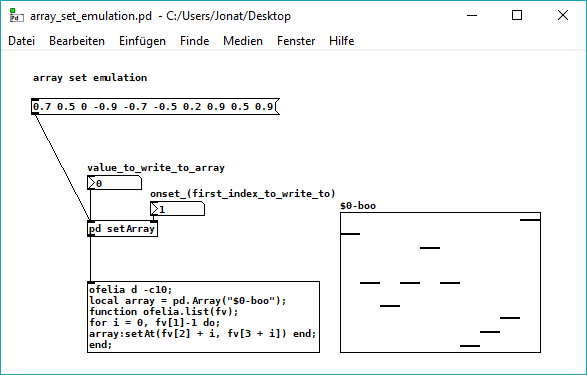
but the last value of the list is always written to the last value of the array, doesnt matter which onset value is set.
i think because of the code in ofeliaBindings.h "n=size-1" which is meant for setting a single value?void setAt(int n, t_floatarg f) { t_garray *a; int size; t_word *vec; if (exists(&a) && getData(a, &size, &vec)) { if (n < 0) n = 0; else if (n >= size) n = size - 1; vec[n].w_float = f; garray_redraw(a); }``` -
@Jona Hi, I can confirm that pd.Array's setTable() function doesn't work properly on Windows.
Like you said, It seems to only change the array size.
I tested this on Windows, macOS and Linux and strangely this only happens on Windows.Do you mind posting about this issue on https://github.com/cuinjune/ofxOfelia/issues ?
I will work on fixing it as soon as possible.
Thanks! -
@Jona I edited your array set emulation patch and it seems to work.
array_set_emulation.pd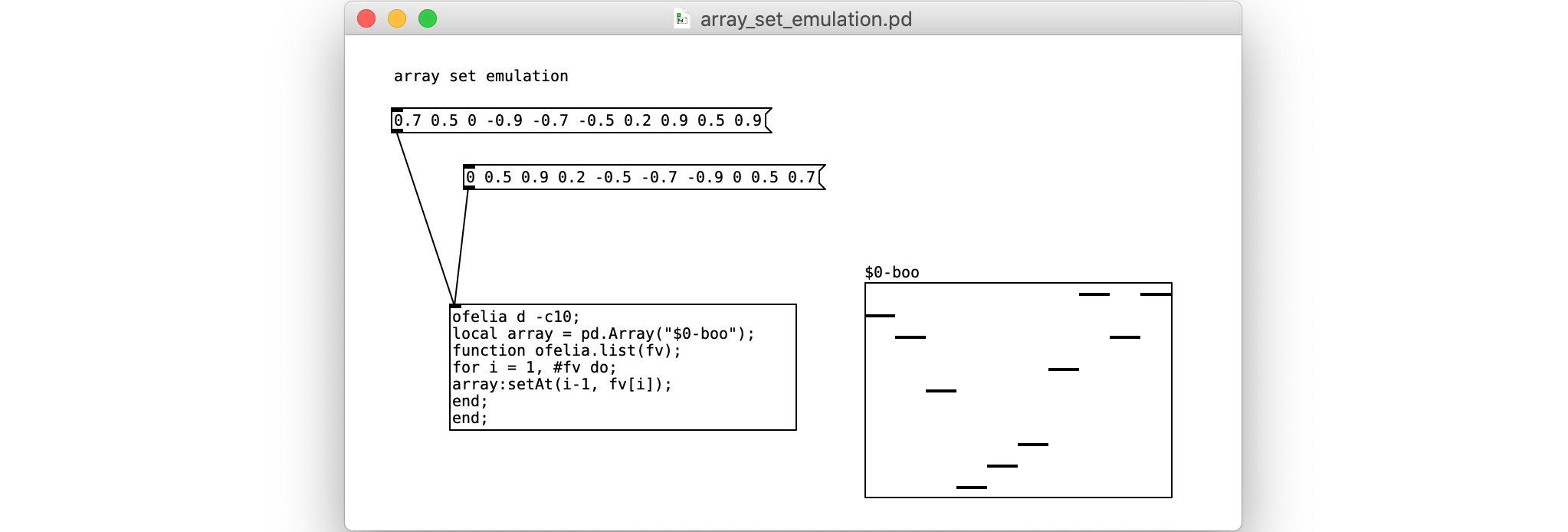
-
hi @cuinjune thanks for the edited array_set_emulation patch, it works now
 i will post the pd.Array's setTable() issue on your github page soon.
i will post the pd.Array's setTable() issue on your github page soon.
edit: just realized that your array set emulation only seems to work if the onset value is zero too, but perhaps the onset option isnt needed anyways (or there are other ways to achieve that). -
@Jona Hi, I added the onset option.

array_set_emulation.pd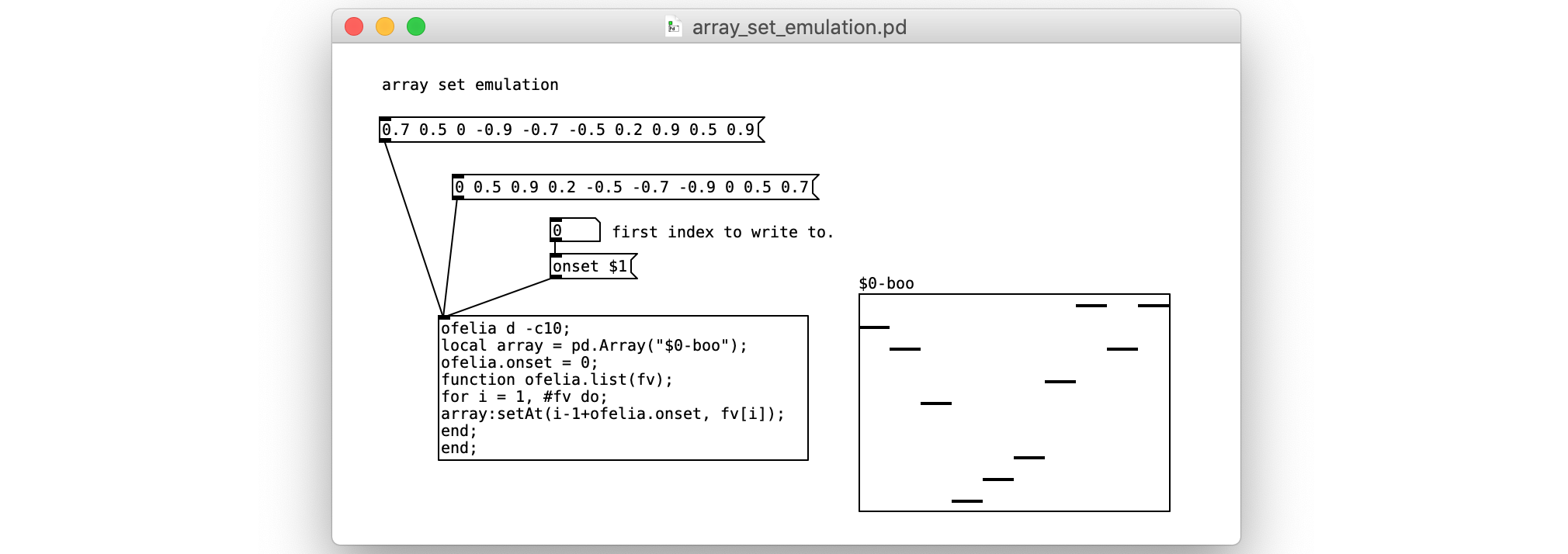
-
@cuinjune thanks
 somehow i still get the same "bug" as i got in my attempt. the last value of the input list is always set to the last value of the array independently from the onset (if there are more values in the input list than are in the table left after the onset)... but perhaps its again a windows specific problem?
somehow i still get the same "bug" as i got in my attempt. the last value of the input list is always set to the last value of the array independently from the onset (if there are more values in the input list than are in the table left after the onset)... but perhaps its again a windows specific problem? -
@Jona I'm sorry that happens when calling array:setAt() using the index larger than the array size in which case it internally clips the index to the "arraysize -1" (or last index).
This version will fix the issue. Let me know if it didn't.
array_set_emulation2.pd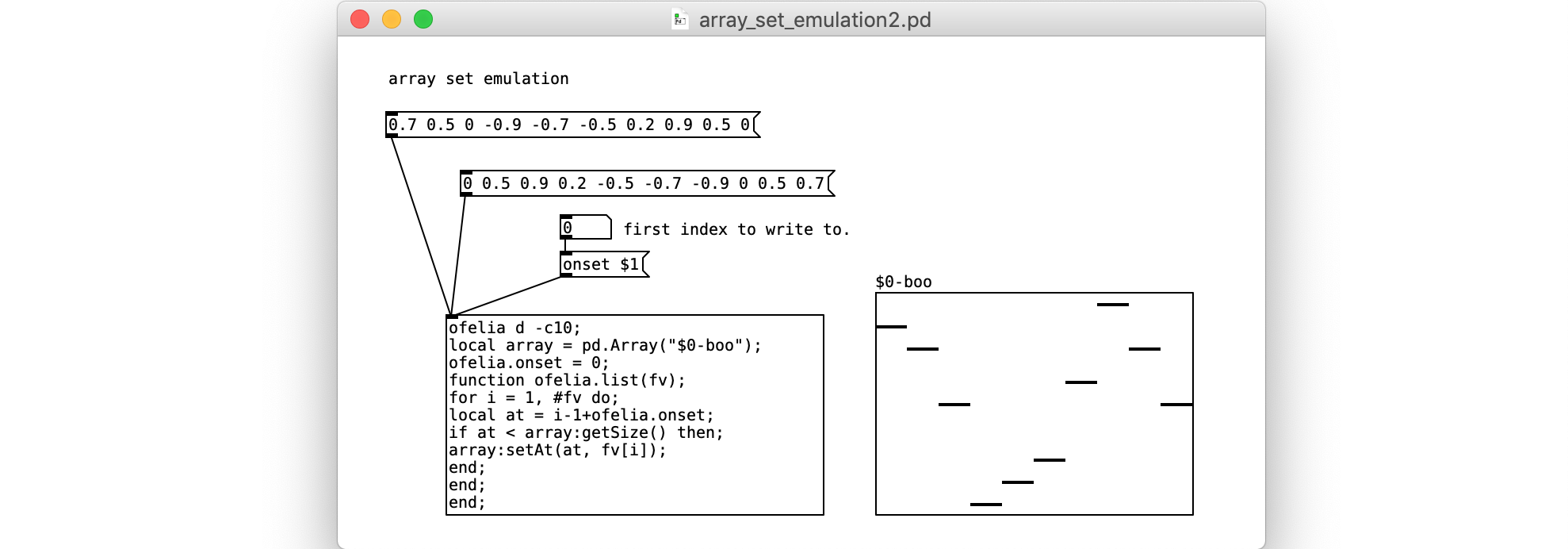
-
yes, thats it. thanks
 sorry if i didnt explain my (theoretical) problem precise enough.
sorry if i didnt explain my (theoretical) problem precise enough.


